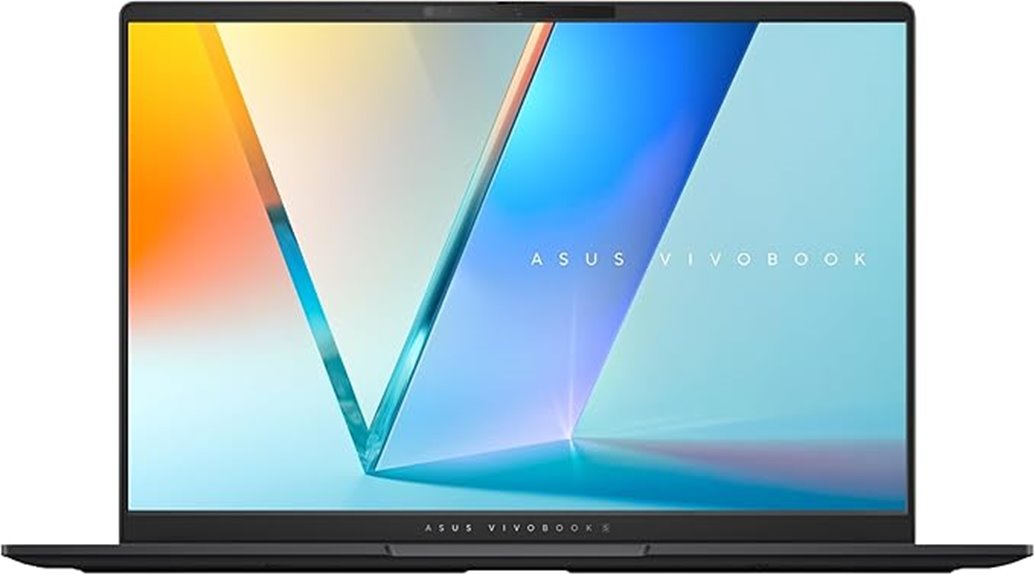Best Laptop for Genealogy Research (Top 5 Picks for 2025)
When you’re on the hunt for your family’s history, the right laptop can make everything easier. Consider the Apple 2024 MacBook Pro for its power, or the Acer Swift X 14 if you need portability. The Apple 2025 MacBook Air is great for long sessions, while the ASUS Vivobook S offers excellent multitasking. Don’t overlook the Samsung Galaxy Book4 Pro for its lightweight design. Stick around to discover factors that’ll help you make the best choice.
In the interest of full disclosure, we would like to inform you that some links on our website are affiliate links. By clicking on these links and completing a purchase from our partners, we may receive a nominal commission at no extra cost to you. Rest assured, our affiliate partnerships do not compromise the integrity of our editorial content or product evaluations. For further clarification, kindly refer to our comprehensive affiliate disclosure.
Table of Contents
What Are the Best Laptop for Genealogy Research to Buy This Year?
Here are my top picks for the best laptop for genealogy research, you can consider this year.
Apple MacBook Pro Laptop with M4 Chip (14.2-inch Liquid Retina XDR Display)

If you’re serious about genealogy research, the Apple 2024 MacBook Pro with the M4 chip is a powerful ally. Its 10-core CPU and GPU ensure you can multitask effortlessly, whether you’re running spreadsheets or scanning historical documents. The stunning 14.2-inch Liquid Retina XDR display, with peak brightness of 1600 nits, makes it easy to view intricate details in your family tree. Plus, with 16GB of unified memory and 512GB SSD storage, you’ll have ample space for all your research. Enjoy all-day battery life, allowing you to dive deep into your ancestry without interruption or worry about finding a power outlet.
Best For: Genealogy researchers and professionals seeking a powerful, reliable laptop for multitasking and detailed visual work.
Pros:
- Exceptional Performance: The M4 chip with a 10-core CPU and GPU allows for seamless multitasking and efficient running of demanding applications.
- Stunning Display: The 14.2-inch Liquid Retina XDR display offers high brightness and contrast, making it ideal for viewing intricate details in documents and images.
- All-Day Battery Life: Provides consistent performance without the need for frequent charging, allowing for extended research sessions.
Cons:
- Limited Storage Options: The 512GB SSD may not be sufficient for users with extensive data and large files.
- Price Point: As a premium device, it may be out of budget for some users compared to other options on the market.
- Weight: The laptop may be heavier than some alternatives, which can affect portability for users on the go.
Acer Swift X 14 Laptop (SFX14-72G-77NJ)
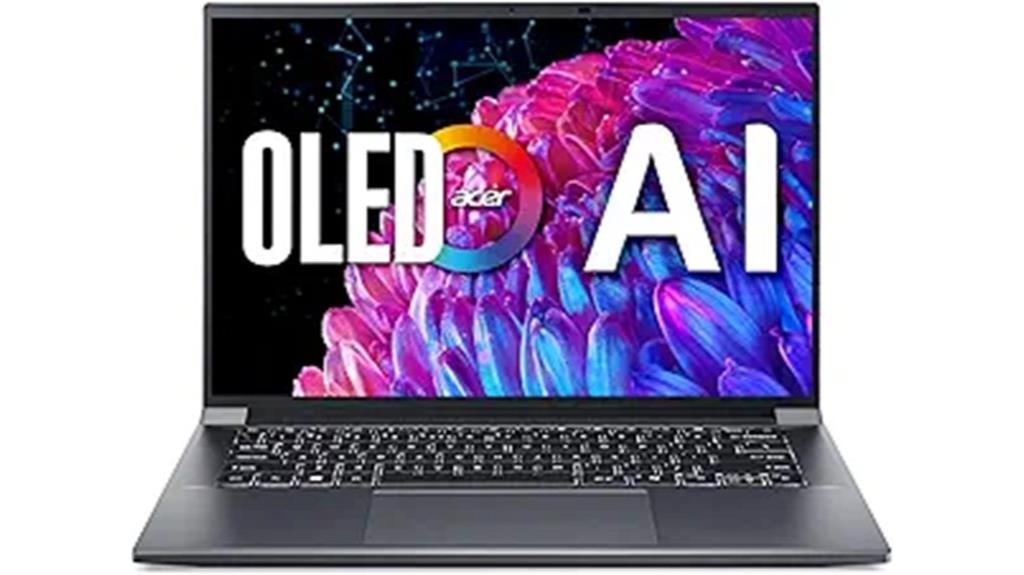
The Acer Swift X 14 Laptop (SFX14-72G-77NJ) stands out as an exceptional choice for genealogy researchers who need a blend of power and portability. With an Intel Core Ultra 7 processor and NVIDIA GeForce RTX 4060 GPU, it effortlessly handles demanding genealogy software. The stunning 14.5-inch OLED display ensures your family trees and documents are vibrant and clear. Plus, its AI features, like the dedicated Copilot Key, enhance multitasking capabilities. Equipped with 16GB RAM and 1TB SSD, you’ll enjoy fast performance and ample storage. The built-in 1080p webcam and collaboration tools make virtual family meetings a breeze.
Best For: Genealogy researchers seeking a powerful, portable laptop that excels in multitasking and displays vibrant visuals.
Pros:
- High-performance hardware with Intel Core Ultra 7 and NVIDIA GeForce RTX 4060 for demanding software.
- Stunning 14.5-inch OLED display with Calman Verified color accuracy for clear and vibrant visuals.
- Robust AI features and dedicated Copilot Key enhance productivity and multitasking capabilities.
Cons:
- Limited upgrade options due to soldered RAM and SSD.
- Potentially high power consumption under heavy loads despite low power efficiency features.
- Weight may be heavier than typical ultraportable laptops, affecting portability.
Apple 2025 MacBook Air 15-inch Laptop with M4 Chip
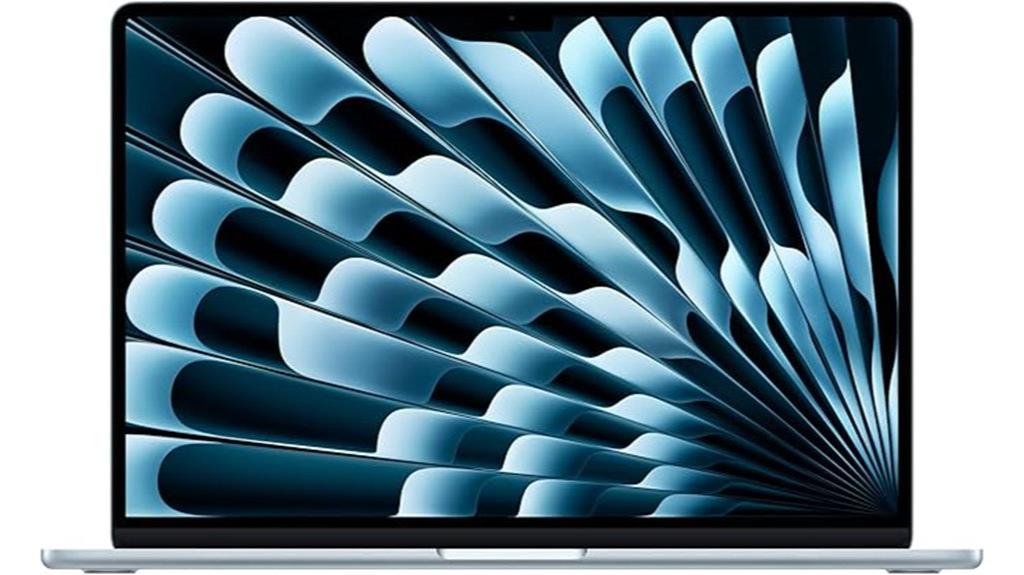
For genealogists seeking a powerful tool for research, the Apple 2025 MacBook Air 15-inch Laptop with M4 Chip stands out with its impressive performance and speed. Its M4 chip ensures fluid multitasking, whether you’re analyzing records or editing videos. You’ll enjoy up to 18 hours of battery life, perfect for long research sessions. The stunning 15.3-inch Liquid Retina display showcases rich colors and sharp details, making it easy to view photos and documents. Plus, the 12MP Center Stage camera and Spatial Audio enhance your video calls. With robust privacy features, your family history remains secure while you explore.
Best For: Genealogists and researchers who need a high-performance laptop for multitasking, video editing, and secure data handling.
Pros:
- Impressive performance with the M4 chip allows for smooth multitasking and quick processing of large files.
- Long battery life of up to 18 hours ensures you can work on research without frequent charging interruptions.
- High-quality display with 1 billion colors provides excellent clarity for viewing photos and documents.
Cons:
- Limited port selection with only two Thunderbolt 4 ports may require additional adapters for some peripherals.
- Price point may be higher compared to other laptops with similar features.
- Weight may be slightly more than other ultra-portable options, making it less ideal for travel.
ASUS Vivobook S 14 OLED Slim Laptop (M5406WA-DS76)
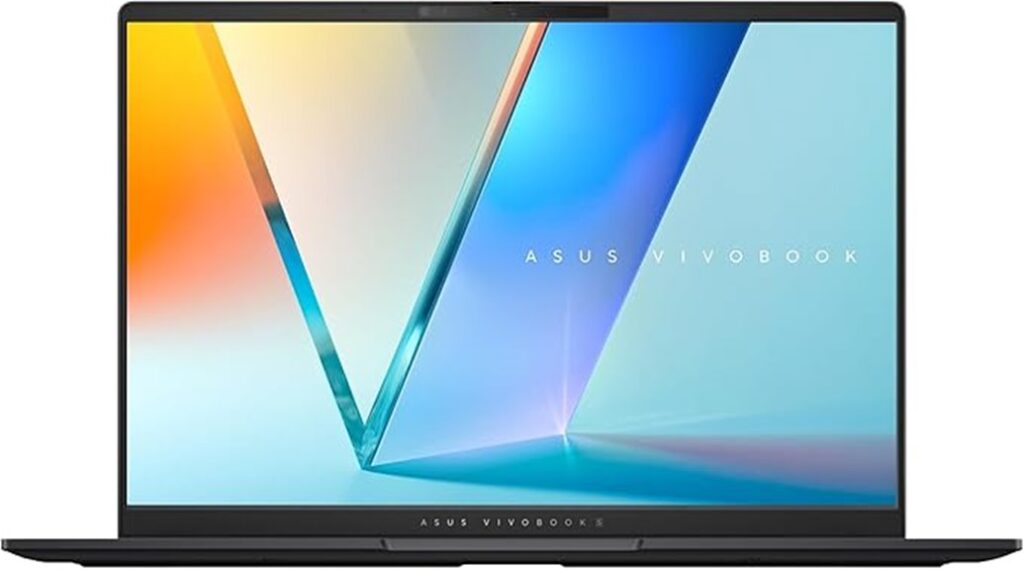
With its powerful AMD Ryzen 9 365 processor and 24GB of LPDDR5X RAM, the ASUS Vivobook S 14 OLED Slim Laptop (M5406WA-DS76) stands out as an ideal choice for genealogy researchers who need to handle large databases and multiple applications simultaneously. The stunning 14-inch 3K OLED display, boasting 600 nits peak brightness and a 120Hz refresh rate, makes viewing your family history documents a pleasure. Weighing just 2.87 lbs and measuring only 0.63 inches thick, it’s easy to take on the go. Plus, with customizable RGB backlighting, you can personalize your typing experience while staying productive.
Best For: Genealogy researchers who need a powerful laptop for managing large databases and multitasking efficiently.
Pros:
- Powerful performance with AMD Ryzen 9 365 processor and 24GB RAM for seamless multitasking.
- Stunning display featuring a 3K OLED screen with high brightness and fast response time, perfect for viewing detailed documents.
- Lightweight and portable design at just 2.87 lbs, making it easy to carry for on-the-go research.
Cons:
- Limited storage capacity with only 512GB SSD, which may require external storage solutions for extensive data.
- Price point may be higher compared to other laptops with similar specifications.
- RGB backlighting may not appeal to all users, especially those preferring a more traditional keyboard aesthetic.
Samsung Galaxy Book4 Pro Business Laptop (NP944XGK-KG4US)
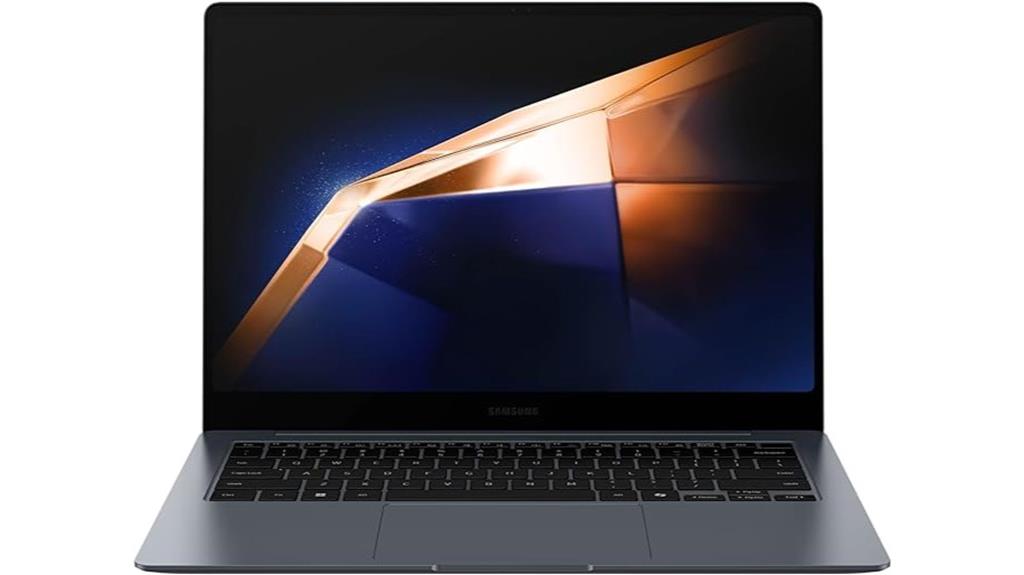
Ideal for genealogy researchers, the Samsung Galaxy Book4 Pro Business Laptop combines power and portability in a sleek design. With an Intel Core Ultra 7 processor and 32GB of RAM, multitasking becomes effortless as you explore family histories. The stunning 14-inch 3K AMOLED touchscreen delivers vibrant visuals, perfect for reviewing documents or images. Weighing only 2.71 lbs, it’s easy to carry around during research trips. Plus, with up to 8 hours of battery life and fast charging, you won’t miss a beat. Integrated tools like Samsung Quick Share enhance your workflow, making it a solid choice for your genealogy needs.
Best For: Genealogy researchers looking for a powerful and portable laptop to enhance their research experience.
Pros:
- Lightweight and portable design at only 2.71 lbs, making it easy to carry during research trips.
- Stunning 14-inch 3K AMOLED touchscreen provides vibrant visuals for reviewing documents and images.
- High-performance Intel Core Ultra 7 processor and 32GB of RAM support seamless multitasking.
Cons:
- Higher retail price compared to competitors, which may deter budget-conscious buyers.
- Limited RAM upgrade options in certain regions (max 16GB) restrict future enhancements.
- Perceived low-quality OEM SSD from Western Digital may not meet expectations for value.
READ MORE: Best Laptop for Podcast, Best Laptop for Podcasting and Video Editing, Best Laptop for Multiple Monitors, Best Laptops for Fusion 360, Best Laptop for Bloggers, Best Laptop for Animation and Graphic Design, Best Laptop for Xactimate, Best Laptop for Virtual Assistant, Best Laptop for Plc Programming, Best Laptops for Bloggers
Factors to Consider When Choosing the Best Laptop for Genealogy Research
When choosing a laptop for genealogy research, you need to consider several key factors. Think about your processing power needs, how important display quality is for viewing documents, and the battery life you’ll require for long research sessions. Don’t forget to factor in software compatibility and the laptop’s portability—these aspects can make a big difference in your overall experience.
Processing Power Needs
Choosing the right laptop for genealogy research hinges on processing power, as you’ll need a machine that can handle demanding software and large datasets. Look for a powerful processor with multiple cores and a high clock speed to ensure efficient data processing and multitasking. Aim for at least 16GB of RAM to smoothly run multiple applications and manage extensive genealogical databases. Opt for a solid-state drive (SSD) for faster performance and quicker loading times, especially when dealing with large records and images. While integrated graphics might suffice for basic tasks, a dedicated graphics processing unit (GPU) is beneficial for rendering complex family trees. Lastly, prioritize long battery life, allowing you to conduct research without constant recharging.
Display Quality Matters
While diving into genealogy research, having a high-quality display can significantly enhance your experience. A high-resolution display, like 3K or 4K, boosts clarity, making it easier to read and analyze fine details in documents and images. Look for features such as color accuracy and high brightness levels—aim for 100% DCI-P3 color gamut and peak brightness of 1600 nits for vibrant visuals. A higher refresh rate, like 120Hz, ensures smooth scrolling through extensive family trees, while touchscreen capabilities allow for quick zooming on specific areas. Additionally, a larger aspect ratio, such as 16:10, offers more screen real estate, enabling you to view multiple documents simultaneously without switching tabs. This combination makes your research process more efficient and enjoyable.
Battery Life Importance
Having a laptop with excellent battery life is crucial for genealogy research, especially since you often need to access online databases or conduct research in libraries and archives. Laptops that offer up to 18 hours of battery life allow you to work for extended periods without frequent charging, keeping you focused on your research. Reliable battery performance ensures you can access vital resources during field research without worrying about losing power. With all-day battery life, you can run multiple applications for data collection and organization efficiently. Plus, if your laptop has fast charging capabilities, you can quickly recharge during breaks, minimizing downtime and keeping your research momentum going strong.
Software Compatibility Considerations
When diving into genealogy research, it’s essential to consider software compatibility to ensure your laptop can handle the demands of various programs. Start by checking that your laptop’s operating system aligns with major genealogy software like Ancestry.com and Family Tree Maker, which require specific versions of Windows or macOS. Look for support for popular data formats, such as GEDCOM files, to streamline importing and exporting family trees. Adequate RAM and processing power are crucial for running resource-intensive databases and visualization tools efficiently. Also, verify that software integrates with cloud services for easy data backup and sharing. Lastly, choose laptops that enable access to collaborative tools, allowing real-time engagement with family trees or databases alongside relatives and researchers.
Portability and Weight
Portability and weight are vital factors in choosing a laptop for genealogy research, especially if you’re often on the move. A lightweight laptop weighing around 2.5 to 3.5 lbs makes carrying your equipment easier during field research. Look for a slim profile, about 0.6 inches thick, so it fits comfortably in your bag or backpack. Battery life is crucial too; choose a model that lasts 8-18 hours on a single charge to ensure you can work uninterrupted when power sources are scarce. Additionally, a display around 14 inches strikes a good balance between usability and compactness, allowing for easier transport without sacrificing visibility. Prioritize these factors to enhance your genealogy research experience.
Frequently Asked Questions
What Is the Best Operating System for Genealogy Research Laptops?
When choosing an operating system for genealogy research, you’ll find Windows and macOS are popular choices. They offer robust software support and user-friendly interfaces, making it easier for you to organize and analyze your family history.
How Much Storage Do I Need for Genealogy Research?
You’ll want at least 256 GB of storage for genealogy research. This size ensures you can store extensive records, images, and documents without running out of space. Consider upgrading if you plan to save large files.
Can I Use a Tablet Instead of a Laptop for Genealogy?
Yes, you can use a tablet instead of a laptop for genealogy. Just ensure it has enough storage and compatible apps. However, a laptop may offer better functionality for extensive research tasks and data management.
Are There Specific Software Recommendations for Genealogy Research?
When researching genealogy, consider using software like Family Tree Maker, Legacy Family Tree, or RootsMagic. These programs offer user-friendly interfaces, robust features, and helpful tools to organize and document your family history effectively.
How Important Is Battery Life for Genealogy Research Laptops?
Battery life’s crucial for genealogy research. You wouldn’t want your laptop dying during a vital session. A longer battery lets you explore archives and documents without constantly searching for a charger or being tethered to an outlet.
My Final Opinion
In conclusion, choosing the right laptop for your genealogy research can make all the difference in uncovering your family history. With options like the MacBook Pro and Acer Swift X, you’ll find powerful performance and stunning displays to help you navigate archives and organize your findings. Remember to consider factors like portability, battery life, and storage as you make your decision. With the right tech, you’ll unlock the secrets of your ancestry with ease!
